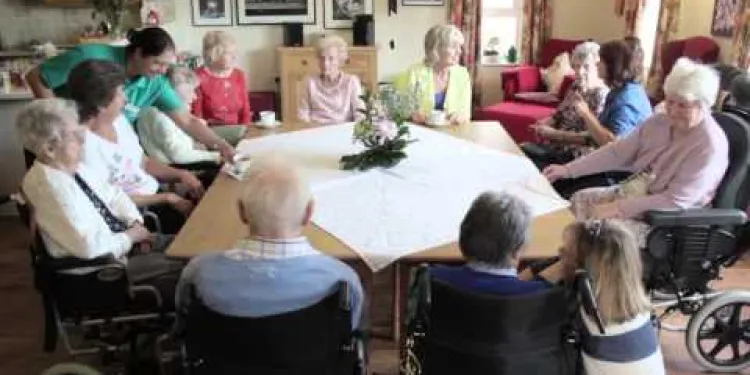Find Help
More Items From Ergsy search
-

The role of care homes dedicated to caring for people living with dementia and memory loss
Relevance: 100%
-

Dementia Care at Colten Care
Relevance: 62%
-

Can live-in care support individuals with dementia?
Relevance: 56%
-

Fernhill Dedicated Dementia Care Home - a relatives perspective
Relevance: 54%
-

What services do care homes provide?
Relevance: 50%
-

Are activities provided for residents in care homes?
Relevance: 49%
-

Are there different types of care homes?
Relevance: 49%
-

What are Care Homes?
Relevance: 48%
-

What is dementia?
Relevance: 48%
-

How does dementia progress over time?
Relevance: 46%
-

Who can live in a care home?
Relevance: 45%
-

Living with dementia | NHS
Relevance: 45%
-

Is live-in care an alternative to nursing homes?
Relevance: 44%
-

Early onset dementia | NHS
Relevance: 44%
-

Dementia by Dr Alex Kakoullis, Coventry and Warwickshire Partnership NHS Trust
Relevance: 42%
-

How is dementia diagnosed?
Relevance: 41%
-

What qualifications do care home staff have?
Relevance: 41%
-

How can I choose the right care home?
Relevance: 41%
-

Do care homes provide medical care?
Relevance: 41%
-

Are there specific types of dementia linked to menopause?
Relevance: 40%
-

Is there a cure for dementia?
Relevance: 39%
-

What should families consider when visiting a care home?
Relevance: 39%
-

How is the quality of care regulated in care homes?
Relevance: 39%
-

What symptoms can overlap between menopause and the early stages of dementia?
Relevance: 39%
-

How are care homes different from nursing homes?
Relevance: 38%
-

Can a concussion cause memory problems?
Relevance: 38%
-

Are dietary needs accommodated in care homes?
Relevance: 37%
-

What are the visiting hours for care homes?
Relevance: 36%
-

How does menopause potentially affect dementia risk?
Relevance: 35%
-

Can residents personalize their living space in a care home?
Relevance: 35%
-

Can couples live together in a care home?
Relevance: 35%
-

Do genetics play a role in dementia risk post-menopause?
Relevance: 35%
-

What are the links between menopause and dementia?
Relevance: 35%
-

Can dementia affect younger people?
Relevance: 35%
-

What rights do residents have in a care home?
Relevance: 34%
-

What role do carers play for those living with dementia?
Relevance: 34%
-

Is the age of menopause onset related to dementia risk?
Relevance: 33%
-

Is there scientific evidence linking menopause to dementia?
Relevance: 33%
-

What is the role of Live In Care?
Relevance: 33%
-

Can technology aid in the care of Alzheimer's patients?
Relevance: 33%
The Role of Care Homes for People Living with Dementia and Memory Loss in the UK
In the United Kingdom, care homes play a critical role in supporting individuals living with dementia and memory loss. These specialized facilities offer a supportive environment where residents can receive tailored care designed to meet their unique needs. As the UK population ages, the demand for dementia care continues to grow, making the role of care homes increasingly important.
Specialized Care and Environment
Care homes dedicated to dementia care provide a safe and secure environment. These homes are typically designed with features that minimize confusion and reduce the risk of accidents. Commonly, the layout is simple and involves clear signage to help residents navigate their surroundings. Moreover, the use of familiar decor can help stimulate memories and provide comfort, leading to a more homely and accommodating space.
Additionally, staff in these care homes are trained specifically in dementia care, enabling them to offer appropriate support and assistance. They are equipped to handle the complexities of behaviors associated with dementia, such as aggression or anxiety, ensuring that residents are treated with respect and dignity.
Personalized Activities and Engagement
Regular engagement in meaningful activities is crucial for people living with dementia. Care homes often provide personalized activities that are tailored to the interests and abilities of each resident. These activities can include reminiscence therapy, music sessions, art classes, and physical exercise, all aimed at enhancing cognitive function and improving quality of life.
By fostering an environment of continual engagement, these homes focus on the well-being of their residents. Activities are designed not only to keep individuals active but also to nurture their sense of identity and self-worth, which can be significantly impacted by memory loss.
Support for Families
Care homes also play a vital role in supporting the families of those living with dementia. They provide a resource for families who may struggle with caregiving responsibilities or need respite from the ongoing demands of care. The professional support offered by care homes reassures families that their loved ones are being looked after with the highest level of care and consideration.
Furthermore, many care homes organize support groups and meetings for family members, facilitating a sense of community and shared understanding where they can cope with the challenges of dementia together.
The Importance of Community Connections
Beyond the physical care provided, these homes often strive to maintain connections with the wider community, offering programs that encourage interactions with local groups and volunteers. Such initiatives not only enrich the lives of the residents but also help reduce the stigma associated with dementia by promoting awareness and understanding among the general public.
In conclusion, care homes dedicated to dementia in the UK provide indispensable services that not only enhance the lives of those living with dementia but also offer essential support to their families, ensuring a comprehensive approach to dementia care.
The Role of Care Homes for People Living with Dementia and Memory Loss in the UK
In the UK, care homes are very important for people with dementia or memory loss. These homes offer special help for each person living there. As there are more older people in the UK, the need for these care homes is growing.
Specialized Care and Environment
Care homes for dementia are safe places. They are built to prevent accidents and confusion. The homes often have easy layouts and clear signs so people can find their way around. Familiar things in the home can help people feel comfortable and remember more.
The staff in these homes know how to help people with dementia. They are trained to deal with tough situations like anger or fear. They always treat residents with respect and kindness.
Personalized Activities and Engagement
Doing fun and meaningful activities is important for people with dementia. Care homes offer activities that fit what each person likes and can do. These can be things like talking about old memories, music, art, and exercise. These help people feel better and stay active.
The activities help people feel good about themselves and keep their brains working. The activities also help them to feel like they belong and have value.
Support for Families
Care homes also help the families of people with dementia. They give families a break when taking care is hard. Families feel better knowing their loved ones are safe and happy in the care home.
Many care homes have meetings and groups for family members. Here, they can talk and share their experiences with others who understand.
The Importance of Community Connections
These homes also try to connect with the local community. They invite local groups and volunteers to visit. This helps make residents’ lives richer and teaches others about dementia. It can also help people understand dementia better and reduce any negative thoughts about it.
In conclusion, care homes in the UK are very important for helping people with dementia and their families. They provide not only care but also support and a sense of community.
Frequently Asked Questions
What are care homes for people with dementia?
Care homes for people with dementia are specialised facilities that provide care and support to individuals living with dementia and memory loss. They offer a safe environment tailored to the needs of residents with cognitive impairments.
How do care homes support individuals with memory loss?
Care homes support individuals with memory loss by offering structured routines, personalised care plans, engaging activities, and a safe environment designed to minimise confusion and enhance quality of life.
Are care homes for dementia regulated in the UK?
Yes, care homes for dementia in the UK are regulated by the Care Quality Commission (CQC) to ensure they meet national standards of care and safety.
What qualifications do staff in dementia care homes have?
Staff in dementia care homes are typically trained in dementia care, including recognising symptoms and understanding the specific needs of individuals with memory loss. Many also have healthcare qualifications like NVQs in Health and Social Care.
What types of activities are offered in dementia care homes?
Dementia care homes offer activities such as music therapy, arts and crafts, gardening, reminiscence sessions, and gentle physical exercises to stimulate memory and promote well-being.
How can I choose the right dementia care home?
Choose the right dementia care home by considering factors like location, staff qualifications, resident feedback, available activities, and CQC ratings. Visiting potential homes and speaking with staff can also help in making an informed decision.
What is a personalised care plan in a dementia care home?
A personalised care plan is a tailored approach to supporting a resident's individual needs, preferences, and history. It outlines specific care strategies and goals for enhancing the resident's quality of life.
Can dementia care homes handle medical needs?
Yes, dementia care homes can handle medical needs with the support of trained staff who work alongside healthcare professionals to manage medications and monitor health conditions.
Are there secure environments in dementia care homes?
Dementia care homes are designed with security in mind, offering safe and secure environments to prevent residents from wandering and to ensure their safety and comfort.
How is nutrition managed in dementia care homes?
Nutrition is carefully managed in dementia care homes, where meals are planned considering residents' dietary needs and preferences. Staff are trained to assist residents with eating if needed.
What support is available for families of residents?
Families are supported through regular communication, family meetings, and advice from staff on how best to continue engaging with loved ones living with dementia.
Are there visiting hours in dementia care homes?
Visiting hours can vary by home, but many dementia care homes offer flexible visiting policies to accommodate family members' schedules while ensuring residents' well-being.
Do dementia care homes provide end-of-life care?
Yes, many dementia care homes provide end-of-life care, working closely with palliative care teams to ensure comfort and dignity for residents in their final stages of life.
How is privacy respected in dementia care homes?
Privacy is respected in dementia care homes through private rooms, respecting residents' personal boundaries, and ensuring confidentiality in all communications and care plans.
Are there any financial assistance options for dementia care?
Financial assistance options, such as local authority funding, Attendance Allowance, and NHS Continuing Healthcare, may be available to help cover the costs of dementia care, depending on individual circumstances.
What are homes for people with dementia?
A care home is a special place where people with dementia live. Dementia means a person has trouble remembering things. In a care home, kind people help take care of them.
Staff at the care home help with everyday things like eating, dressing, and bathing. They make sure everyone is safe and comfortable.
To help understand more about care homes, you can:
- Ask someone you trust to explain more.
- Watch videos about care homes.
- Visit a care home to see what it is like.
Care homes for people with dementia are special places. They help people who have trouble remembering things. These homes keep people safe and give them the help they need.
How do care homes help people who forget things?
Care homes are places where people who need help can live. Some people forget things because of memory problems. Care homes have special ways to help them.
- Friendly Support: Kind and caring staff help people every day. They talk to them and make sure they are okay.
- Safe Environment: Care homes are safe places to live. They are designed so people don’t get lost or hurt.
- Daily Routines: Doing the same things each day helps people remember better. Care homes have plans for daily activities.
- Fun Activities: There are games and exercises to help people exercise their brains and have fun.
- Pictures and Signs: Pictures and signs help people find their way around. They also help them remember important things.
It’s important for people with memory problems to feel safe and cared for. These tools help them live their lives more happily.
Care homes help people who have trouble remembering things. They do this by:
- Having set daily routines.
- Making special care plans for each person.
- Offering fun activities to keep people busy.
- Providing a safe place that helps people feel less confused and happy.
Tools like picture cues or simple schedules can be helpful too.
Do people check if care homes for dementia follow rules in the UK?
Yes, there are people who make sure that care homes in the UK follow special rules. These rules are to make sure everyone is safe and well looked after.
To help understand more, you can ask someone you trust to explain it to you. You can also use pictures or videos to learn about care homes.
Yes, care homes for people with dementia in the UK are checked by a group called the Care Quality Commission (CQC). They make sure the care homes are safe and look after the people well.
What qualifications do staff in dementia care homes have?
What qualifications do staff in dementia care homes have?
Staff in dementia care homes have training to help and understand people with memory problems.
These workers learn how to care for and support people with dementia.
They might take special classes and get certificates. Some might go to college to learn more.
Tools that help staff include:
- Training videos
- Books with simple steps
- Workshops where they practice skills
If you need more information, ask the staff or a family member for help.
People who work in homes for people with dementia learn special skills. They are taught how to see when someone with dementia needs help. They learn what people with memory loss need. Many workers also have special certificates in taking care of people.
What fun things can people do in dementia care homes?
People living in dementia care homes can do different fun things. These activities help them feel happy and stay healthy. Here are some examples:
- Arts and Crafts: Painting, drawing, or making things with their hands.
- Music Time: Listening to music, singing songs, or playing easy instruments.
- Exercise: Gentle exercises like stretching, walking, or yoga.
- Games: Simple games or puzzles to help with memory and thinking.
- Gardening: Planting flowers or vegetables and taking care of them.
- Social Activities: Spending time with friends or having group talks.
These activities help people in dementia care homes have fun and connect with others.
Some tools and techniques that can help:
- Picture Cards: Use pictures to show what the activities are about.
- Routine: Doing activities at the same time every day helps people feel safe.
- Calming Spaces: Have quiet areas where people can relax when they need to.
Dementia care homes are places where people can get help. They do fun activities like music, art, planting flowers or vegetables, talking about old memories, and easy exercises. These activities help people remember things and feel happy.
How do I pick the best dementia care home?
Choosing a care home for someone with dementia is important. Here's how you can do it:
- Visit the home: Go to the care home. See what it's like.
- Meet the staff: Talk to the people who work there. Ask them questions.
- Look at the rooms: See if the rooms are nice and comfortable.
- Check activities: Find out what fun things they do each day.
- Read reviews: Look for what other people say about the care home.
Always ask questions and take your time. It helps to bring a family member or friend with you for support.
You can also use pictures or notes to help remember what you see.
When picking a dementia care home, think about:
- Where it is (location).
- How skilled the staff are (staff qualifications).
- What other people say (resident feedback).
- What fun things you can do there (available activities).
- What ratings it has (CQC ratings).
Go visit the homes you like and talk to the people who work there. This will help you choose the best one.
Using tools like picture cards or a checklist can help when visiting homes.
What is a personalised care plan in a dementia care home?
A personalised care plan is a special plan made just for a person living in a dementia care home. This plan helps make sure they get the right care. It listens to what the person needs and likes.
The care plan can include:
- What the person likes to eat.
- Their favourite activities or games.
- How they like to be helped each day.
- Any medicine they need to take.
Making the care plan involves talking to the person, their family, and the care team. This way, everyone knows how to help best.
If someone needs help understanding or talking about their care plan, pictures or simple words can be used. Families can also ask for help from someone called an advocate. An advocate is a person who helps speak up for someone’s needs.
A personalised care plan is a special plan made just for each person. It helps make sure they get the care they need. It thinks about what they like and their past. This plan shows how to help the person feel better and have a good life.
Can homes for people with dementia care for their health?
Yes, dementia care homes can help with medical needs. They have trained staff who work with doctors and nurses to give medicine and check health problems.
Are dementia care homes safe places?
Do people with dementia live in a safe place in care homes?
It is important to know:
- Care homes have staff to help.
- Doors often have locks for safety.
- There may be alarms or cameras.
Help tools:
- Ask someone you trust for help.
- Use pictures or symbols to understand better.
- Listen to information on an audio player.
Dementia care homes are safe places. They make sure people do not get lost and feel comfortable.
How do dementia care homes manage food?
Dementia care homes help people eat healthy food. They make sure everyone gets the right food they need. The meals are balanced with good things like vegetables and proteins.
Here are some ways they help with meals:
- Careful planning: They plan meals that are tasty and healthy.
- Special help: If someone needs help eating their food, caregivers are there to help.
- Easy-to-eat food: They sometimes make food soft or cut it up small to help people eat it easily.
If someone has a special diet, they make special meals just for them. They try to make mealtimes happy and relaxing for everyone.
In care homes for people with dementia, food is given a lot of thought. Meals are made to fit what each person likes and needs. Helpers are trained to help people eat if they need it.
How can families get help?
Families can get different kinds of help.
If you want to talk to someone, there are people who can listen.
You can also join groups to meet others who have family living in care homes.
Ask if there are special meetings at the place your family member lives.
Sometimes, there are things like newsletters or online groups you can join.
Always ask the people at the care home what help they have for you.
We help families by talking to them often. We have family meetings. Our team gives advice on how to spend time with loved ones who have dementia.
Can I visit someone in a dementia care home?
Yes, you can visit. It is good to check what times are best to visit. You can ask the care home staff for this information.
You can use pictures and big text to help remember the times and rules. You can also ask someone to remind you when to visit.
Visiting times can be different at each home. Many homes for people with dementia try to be flexible. This means they let families visit at different times so they can see their loved ones. This helps the people living there to be happy and healthy.
Do homes for people with dementia help when someone is dying?
Yes, lots of care homes for people with dementia can help when someone is very sick and near the end of life. They work with special doctors and nurses to make sure the person feels comfortable and is treated with respect.
How do dementia care homes respect privacy?
Privacy means keeping personal things and information safe and private. In dementia care homes, people try hard to respect each person's privacy. Here are some ways they do it:
- Personal Space: People have their own rooms where they can keep their belongings.
- Respectful Staff: Caregivers always knock on the door before entering a person's room.
- Private Conversations: Staff have private talks if the person or their family wants to discuss personal things.
Using these methods helps people feel safe and respected in care homes.
In dementia care homes, people's privacy is looked after. They have their own rooms, and staff respect their personal space. All talks and plans about their care are kept secret.
Can I get help to pay for dementia care?
There are different ways to get money help if you need to pay for dementia care. This might include help from your local council, getting an Attendance Allowance, or NHS Continuing Healthcare. It depends on your own situation.
Useful Links
This website offers general information and is not a substitute for professional advice.
Always seek guidance from qualified professionals.
If you have any medical concerns or need urgent help, contact a healthcare professional or emergency services immediately.
- Ergsy carfully checks the information in the videos we provide here.
- Videos shown by Youtube after a video has completed, have NOT been reviewed by ERGSY.
- To view, click the arrow in centre of video.
- Most of the videos you find here will have subtitles and/or closed captions available.
- You may need to turn these on, and choose your preferred language.
- Go to the video you'd like to watch.
- If closed captions (CC) are available, settings will be visible on the bottom right of the video player.
- To turn on Captions, click settings .
- To turn off Captions, click settings again.
More Items From Ergsy search
-

The role of care homes dedicated to caring for people living with dementia and memory loss
Relevance: 100%
-

Dementia Care at Colten Care
Relevance: 62%
-

Can live-in care support individuals with dementia?
Relevance: 56%
-

Fernhill Dedicated Dementia Care Home - a relatives perspective
Relevance: 54%
-

What services do care homes provide?
Relevance: 50%
-

Are activities provided for residents in care homes?
Relevance: 49%
-

Are there different types of care homes?
Relevance: 49%
-

What are Care Homes?
Relevance: 48%
-

What is dementia?
Relevance: 48%
-

How does dementia progress over time?
Relevance: 46%
-

Who can live in a care home?
Relevance: 45%
-

Living with dementia | NHS
Relevance: 45%
-

Is live-in care an alternative to nursing homes?
Relevance: 44%
-

Early onset dementia | NHS
Relevance: 44%
-

Dementia by Dr Alex Kakoullis, Coventry and Warwickshire Partnership NHS Trust
Relevance: 42%
-

How is dementia diagnosed?
Relevance: 41%
-

What qualifications do care home staff have?
Relevance: 41%
-

How can I choose the right care home?
Relevance: 41%
-

Do care homes provide medical care?
Relevance: 41%
-

Are there specific types of dementia linked to menopause?
Relevance: 40%
-

Is there a cure for dementia?
Relevance: 39%
-

What should families consider when visiting a care home?
Relevance: 39%
-

How is the quality of care regulated in care homes?
Relevance: 39%
-

What symptoms can overlap between menopause and the early stages of dementia?
Relevance: 39%
-

How are care homes different from nursing homes?
Relevance: 38%
-

Can a concussion cause memory problems?
Relevance: 38%
-

Are dietary needs accommodated in care homes?
Relevance: 37%
-

What are the visiting hours for care homes?
Relevance: 36%
-

How does menopause potentially affect dementia risk?
Relevance: 35%
-

Can residents personalize their living space in a care home?
Relevance: 35%
-

Can couples live together in a care home?
Relevance: 35%
-

Do genetics play a role in dementia risk post-menopause?
Relevance: 35%
-

What are the links between menopause and dementia?
Relevance: 35%
-

Can dementia affect younger people?
Relevance: 35%
-

What rights do residents have in a care home?
Relevance: 34%
-

What role do carers play for those living with dementia?
Relevance: 34%
-

Is the age of menopause onset related to dementia risk?
Relevance: 33%
-

Is there scientific evidence linking menopause to dementia?
Relevance: 33%
-

What is the role of Live In Care?
Relevance: 33%
-

Can technology aid in the care of Alzheimer's patients?
Relevance: 33%


